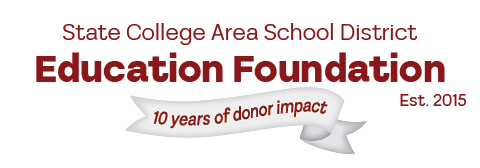In honor of Counseling Awareness Month, we’d like to thank the SCASD counselors who guide and support their students every day. Now more than ever, their work is critical in shaping our kids’ lives. One component of the SCASD Education Foundation’s mission is to make mental health resources available to all students. In recent years, statistics about suicidal ideations and attempts among high school students have been alarming. We value the work of counselors like Paul Brigman, a SCASD grad who is now giving back to the district. Brigman hopes to see counseling and other mental health services destigmatized.
Spotlight on Counselor Paul Brigman
Paul Brigman is an avid musician, adventurer, storyteller, optimist, and supporter of State High students. He is in his third year serving as a school counselor at State High, and completed a year-long master’s internship at Mount Nittany Middle School prior to assuming his current position, but his SCASD experience began well before becoming a faculty member.
Brigman is a class of 2000 State High alumnus. During his high school years, he played ice hockey; performed original music around State College in a band; studied culinary arts through the Career and Technical Center; and participated in a program emphasizing technology, humanities, and the environment that informed his career development. In 12th grade, he attended the Delta Program, where he began to see teaching and learning as a “collaborative journey” and came to understand the profound impact that a sense of community can have on a student’s experience.
After graduating from State High, Brigman went on to obtain his bachelor’s and master’s from Penn State in 2004 and 2013 respectively. From 2005 to 2011 he worked at Shaver’s Creek Environmental Center as the on-site director of its residential experiential education program and environmental summer camps. In these programs, he provided instruction and counseling services to participants, assumed administrative duties, ensured that camper/student safety was a top priority, and developed curriculum that supported schools’ science programs.
Brigman says his “passion has always been helping students to find value and fulfillment through educational experiences and to develop an appreciation for being part of a strong community that values respect for one another and for one’s self,” making high school counseling a natural fit.
For Brigman, the most rewarding aspect of being a counselor at the high school is helping students to reach their academic, personal, and extracurricular goals by building and strengthening relationships with students and their families. Brigman noted that “counselors have the unique gift of being able to travel with students from the start of high school through graduation,” which affords him the opportunity to not only get to know his students but also “see them evolve from young teens into young adults.”
Helping students face some of the most difficult life hurdles imaginable is one of the biggest challenges of being a school counselor, says Brigman. He said that “the death of a parent or loved one, suicidal thoughts or attempts, clinical depression, abuse—we encounter these cases often.” Witnessing the impact of highly traumatic circumstances on students and their families is an aspect of his work that never becomes routine and is always difficult to accept.
Brigman reports that SCASD has taken a number of key strides toward helping to connect students and families with community providers or in-school support whenever necessary. A recent initiative in the high school has used voluntary screenings to identify and offer support to students who do not show traditional warning signs for emotional or psychological concerns.
But this is just a beginning in addressing the alarmingly high levels of self-reported stress, anxiety, depression, and self-injurious and suicidal ideation among high school students. “Supporting the mental health needs of adolescents is critically important, literally,” said Brigman. In 2013, State High students in grades 10 and 12 completed the Pennsylvania Youth Survey (PAYS), an anonymous state survey that collects data on students’ knowledge, attitudes, and behaviors that may pose a risk to their well-being. According to Brigman, the results indicated that 15% of students in grades 10 and 12 reported both considering and planning a suicide attempt, and 8% of students in both grades reported having completed a suicide attempt.
“These results present us as a school, and as a society, with a very clear and frightening truth about what our students are experiencing internally during their adolescence,” he said. Brigman believes educating students and families on mental health and relevant resources, providing comprehensive professional development to educators and counselors, and enhancing support systems in schools and the community are the steps necessary to prevent, or at least decrease, distress, suffering, and death due to mental health issues in State College and beyond.
He believes providing funds and increased awareness to students, families, and education professionals would enable the district to graduate students with an understanding of how to access and utilize resources and begin to destigmatize mental health issues and services. Additionally, Brigman notes that a great deal of student anxiety is the result of academic struggles, particularly around junior year, and sees room for improvement in the academic support services available at the school to help students keep up with the rigor of their courses.
Brigman’s philosophy is nurturing, supportive, and rooted in meaningful connection: “They say ‘It takes a village to raise a child.’ Well, it takes a community to care for that child until she or he reaches adulthood and beyond.”
